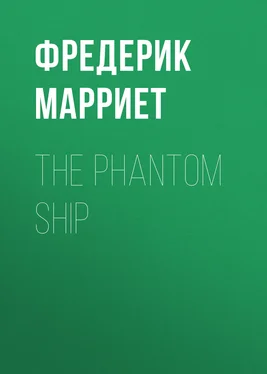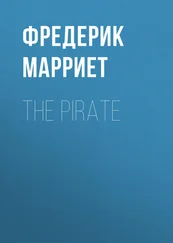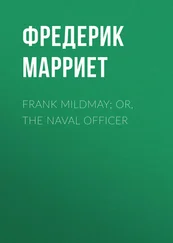Фредерик Марриет - The Phantom Ship
Здесь есть возможность читать онлайн «Фредерик Марриет - The Phantom Ship» — ознакомительный отрывок электронной книги совершенно бесплатно, а после прочтения отрывка купить полную версию. В некоторых случаях можно слушать аудио, скачать через торрент в формате fb2 и присутствует краткое содержание. Жанр: foreign_prose, literature_19, foreign_antique, на английском языке. Описание произведения, (предисловие) а так же отзывы посетителей доступны на портале библиотеки ЛибКат.
- Название:The Phantom Ship
- Автор:
- Жанр:
- Год:неизвестен
- ISBN:нет данных
- Рейтинг книги:5 / 5. Голосов: 1
-
Избранное:Добавить в избранное
- Отзывы:
-
Ваша оценка:
- 100
- 1
- 2
- 3
- 4
- 5
The Phantom Ship: краткое содержание, описание и аннотация
Предлагаем к чтению аннотацию, описание, краткое содержание или предисловие (зависит от того, что написал сам автор книги «The Phantom Ship»). Если вы не нашли необходимую информацию о книге — напишите в комментариях, мы постараемся отыскать её.
The Phantom Ship — читать онлайн ознакомительный отрывок
Ниже представлен текст книги, разбитый по страницам. Система сохранения места последней прочитанной страницы, позволяет с удобством читать онлайн бесплатно книгу «The Phantom Ship», без необходимости каждый раз заново искать на чём Вы остановились. Поставьте закладку, и сможете в любой момент перейти на страницу, на которой закончили чтение.
Интервал:
Закладка:
Such was the state of affairs on board the good ship Ter Schilling , when, in company with two others, she lay becalmed about two days' sail to the Cape. The weather was intensely hot, for it was the summer in those southern latitudes, and Philip, who had been lying down under the awning spread over the poop, was so overcome with the heat that he had fallen asleep. He awoke with a shivering sensation of cold over his whole body, particularly at his chest, and half-opening his eyes, he perceived the pilot, Schriften, leaning over him, and holding between his finger and his thumb a portion of the chain which had not been concealed, and to which was attached the sacred relic. Philip closed them again, to ascertain what were the man's intentions: he found that he gradually dragged out the chain, and, when the relic was clear, attempted to pass the whole over his head, evidently to gain possession of it. Upon his attempt Philip started up and seized him by the waist.
"Indeed!" cried Philip, with an indignant look, as he released the chain from the pilot's hand.
But Schriften appeared not in the least confused at being detected in his attempt: looking with his malicious one eye at Philip, he mockingly observed:
"Does that chain hold her picture?—he! he!"
Vanderdecken rose, pushed him away, and folded his arms.
"I advise you not to be quite so curious, Master Pilot, or you may repent it."
"Or perhaps," continued the pilot, quite regardless of Philip's wrath, "it may be a child's caul, a sovereign remedy against drowning."
"Go forward to your duty, sir," cried Philip.
"Or, as you are a Catholic, the finger-nail of a saint; or, yes, I have it—a piece of the holy cross."
Philip started.
"That's it! that's it!" cried Schriften, who now went forward to where the seamen were standing at the gangway. "News for you, my lads!" said he; "we've a bit of the holy cross aboard, and so we may defy the devil!"
Philip, hardly knowing why, had followed Schriften as he descended the poop-ladder, and was forward on the quarter-deck, when the pilot made this remark to the seamen.
"Ay! ay!" replied an old seaman to the pilot; "not only the devil, but the Flying Dutchman to boot."
"The Flying Dutchman " thought Philip, "can that refer to—?" and Philip walked a step or two forward, so as to conceal himself behind the mainmast, hoping to obtain some information, should they continue the conversation. In this he was not disappointed.
"They say that to meet with him is worse than meeting with the devil," observed another of the crew.
"Who ever saw him?" said another.
"He has been seen, that's sartain, and just as sartain that ill-luck follows the vessel that falls in with him."
"And where is he to be fallen in with?"
"O! they say that's not so sartain—but he cruises off the Cape."
"I should like to know the whole long and short of the story," said a third.
"I can only tell what I've heard. It's a doomed vessel; they were pirates, and cut the captain's throat, I believe."
"No! no!" cried Schriften, "the captain is in her now—and a villain he was. They say that, like somebody else on board of us now, he left a very pretty wife, and that he was very fond of her."
"How do they know that, pilot?"
"Because he always wants to send letters home when he boards vessels that he falls in with. But, woe to the vessel that takes charge of them!—she is sure to be lost, with every soul on board!"
"I wonder where you heard all this," said one of the men. "Did you ever see the vessel?"
"Yes, I did!" screamed Schriften; but, as if recovering himself, his scream subsided into his usual giggle, and he added, "but we need not fear her, boys; we've a bit of the true cross on board." Schriften then walked aft as if to avoid being questioned, when he perceived Philip by the mainmast.
"So, I'm not the only one curious?—he! he! Pray did you bring that on board, in case we should fall in with the Flying Dutchman? "
"I fear no Flying Dutchman ," replied Philip, confused.
"Now I think of it, you are of the same name; at least they say that his name was Vanderdecken—eh?"
"There are many Vanderdeckens in the world besides me," replied Philip, who had recovered his composure; and having made this reply, he walked away to the poop of the vessel.
"One would almost imagine this malignant one-eyed wretch was aware of the cause of my embarkation," mused Philip; "but no! that cannot be. Why do I feel such a chill whenever he approaches me? I wonder if others do; or whether it is a mere fancy on the part of Amine and myself. I dare ask no questions.—Strange, too, that the man should feel such malice towards me. I never injured him. What I have just overheard confirms all; but there needed no confirmation. Oh, Amine! Amine! but for thee, and I would rejoice to solve this riddle at the expense of life. God in mercy check the current of my brain," muttered Philip, "or my reason cannot hold its seat!"
In three days the Ter Schilling and her consorts arrived at Table Bay, where they found the remainder of the fleet at anchor waiting for them. Just at that period the Dutch had formed a settlement at the Cape of Good Hope, where the Indian fleets used to water and obtain cattle from the Hottentot tribes who lived on the coast, and who for a brass button or a large nail would willingly offer a fat bullock. A few days were occupied in completing the water of the squadron, and then the ships, having received from the Admiral their instructions as to the rendezvous in case of parting company, and made every preparation for the bad weather which they anticipated, again weighed their anchors, and proceeded on their voyage.
For three days they beat against light and baffling winds, making but little progress; on the third, the breeze sprang up strong from the southward, until it increased to a gale, and the fleet were blown down to the northward of the bay. On the seventh day the Ter Schilling found herself alone, but the weather had moderated. Sail was again made upon the vessel, and her head put to the eastward, that she might run in for the land.
"We are unfortunate in thus parting with all our consorts," observed Mynheer Kloots to Philip, as they were standing at the gangway; "but it must be near meridian, and the sun will enable me to discover our latitude. It is difficult to say how far we may have been swept by the gale and the currents to the northward. Boy, bring up my cross-staff, and be mindful that you do not strike it against anything as you come up."
The cross-staff at that time was the simple instrument used to discover the latitude, which it would give to a nice observer to within five or ten miles. Quadrants and sextants were the invention of a much later period. Indeed, considering that they had so little knowledge of navigation and the variation of the compass, and that their easting and westing could only be computed by dead reckoning, it is wonderful how our ancestors traversed the ocean in the way they did, with comparatively so few accidents.
"We are full three degrees to the northward of the Cape," observed Mynheer Kloots, after he had computed his latitude. "The currents must be running strong; the wind is going down fast, and we shall have a change, if I mistake not."
Towards the evening it fell calm, with a heavy swell setting towards the shore; shoals of seals appeared on the surface, following the vessel as she drove before the swell; the fish darted and leaped in every direction, and the ocean around them appeared to be full of life as the sun slowly descended to the horizon.
"What is that noise we hear?" observed Philip; "it sounds like distant thunder."
"I hear it," replied Mynheer Kloots. "Aloft there; do you see the land?"
Читать дальшеИнтервал:
Закладка:
Похожие книги на «The Phantom Ship»
Представляем Вашему вниманию похожие книги на «The Phantom Ship» списком для выбора. Мы отобрали схожую по названию и смыслу литературу в надежде предоставить читателям больше вариантов отыскать новые, интересные, ещё непрочитанные произведения.
Обсуждение, отзывы о книге «The Phantom Ship» и просто собственные мнения читателей. Оставьте ваши комментарии, напишите, что Вы думаете о произведении, его смысле или главных героях. Укажите что конкретно понравилось, а что нет, и почему Вы так считаете.












